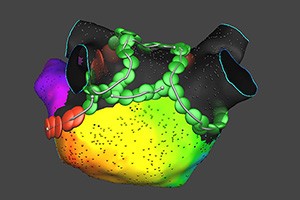Pilot project opens enrollment at Smith Family Clinic for Genomic Medicine
HudsonAlpha Institute for Biotechnology, in collaboration with Phenome Health and the Buck Institute for Research on Aging, has launched a pilot study to explore how genetics and lifestyle influence a person’s risk of developing Alzheimer’s disease and related dementias. The study, called HOPE AD (Healthy Outcomes through Phenomic Explorations for Alzheimer’s Disease), is now enrolling participants at the Smith Family Clinic for Genomic Medicine in Huntsville.
Alzheimer’s disease and other dementias gradually impair memory, function, and quality of life. While there is no known cure, research suggests combining early detection with lifestyle changes may reduce the risk or delay onset.
“Alzheimer’s disease and other dementias begin years before any symptoms appear, so waiting until someone shows signs of memory decline may be too late,” said Nick Cochran, PhD, HudsonAlpha Faculty Investigator and lead researcher at HudsonAlpha on the study. “This project is a chance to shift from reacting to preventing. We’re exploring whether giving people personalized health information can empower them to make changes that protect brain health.”
The pilot study will enroll 200 healthy adults between the ages of 65 and 75 who have a close family member (parent, sibling, or child) with dementia, but don’t have cognitive impairment themselves. The study uses a “phenomic” approach—capturing detailed data about participants’ health, environment, and lifestyle. This helps researchers paint a fuller picture of dementia risk than genetics alone. Results from the pilot will inform a more extensive study in the coming years.
Eligible participants will be invited to an initial visit at the Smith Family Clinic, where they will undergo routine medical exams, including cognitive testing and wellness assessments, and family history/medical history overviews. All participants will receive valuable clinical results, including:
APOE status- a well-known gene linked to Alzheimer’s risk
Polygenic risk score- an analysis that combines multiple genes to provide a more complete picture of disease risk
pTau217 protein levels- a brain protein, or “biomarker,” known to be elevated in early Alzheimer’s disease
Individuals identified as having elevated risk will be invited to continue with the study through a year-long lifestyle intervention program. The program includes personalized coaching on several factors, including nutrition, physical activity, sleep, and cognitive engagement, all of which have evidence for reducing dementia risk. Researchers will also evaluate how these changes impact health over time.
“HOPE AD is about more than just biological data,” said Meagan Cochran, MS, CGC, Director of the Smith Family Clinic and study co-investigator. “We also want to understand how knowing their risk affects people’s choices. Do they feel more motivated to take action? That’s a crucial part of prevention that we hope this study will help answer.”
The long-term vision for HOPE AD is to help create a new standard of care. By determining what works, HOPE AD aims to develop screening tools and prevention strategies that could one day be used broadly in clinical practice.
“HudsonAlpha has long been a leader in genetics and genomics,” said HudsonAlpha President Neil Lamb, PhD. “HOPE AD represents an exciting next step: using that knowledge to inform care, empower participants, and extend the number of dementia-free years people can enjoy.”
Researchers from both collaborating organizations believe HOPE AD could be a model for how precision health can reshape public understanding of Alzheimer’s prevention.
“Combining HudsonAlpha’s deep expertise in genomics with our experience in phenomic analysis and lifestyle behavior interventions could uncover actionable insights that lead to meaningful improvements in Alzheimer’s prevention,” said Jennifer Lovejoy, PhD with Phenome Health.
Study enrollment is open at the Smith Family Clinic for Genomic Medicine. To learn more about the HOPE AD study and see if you’re eligible for enrollment, visit hudsonalpha.org/hopead or call the Smith Family Clinic at 256-327-9640.













